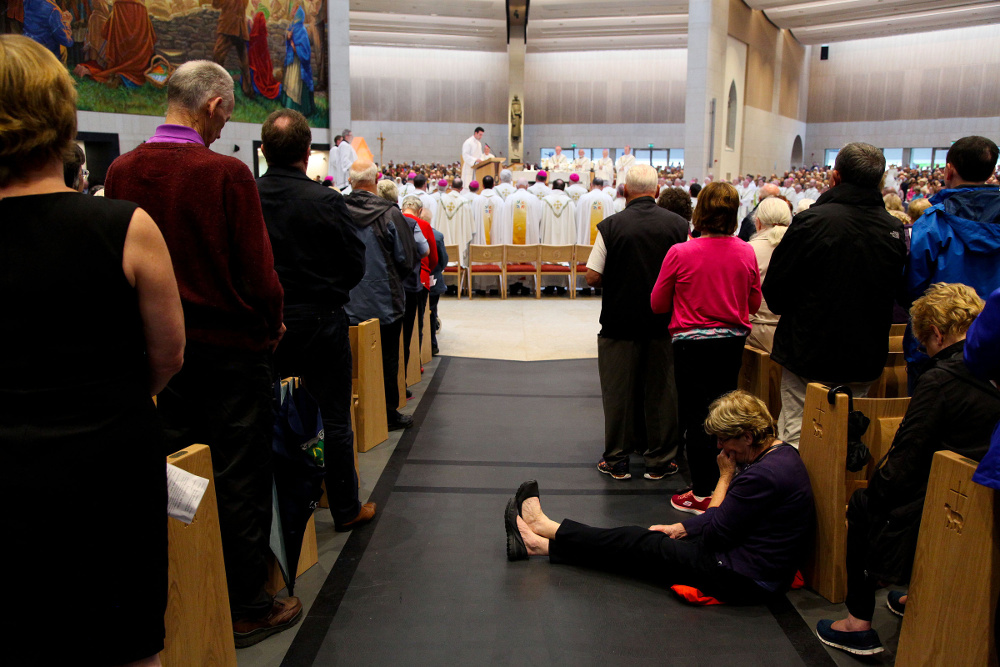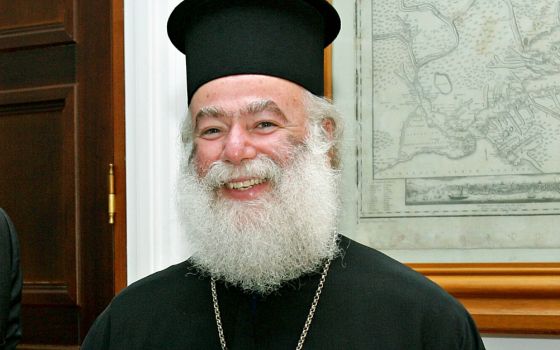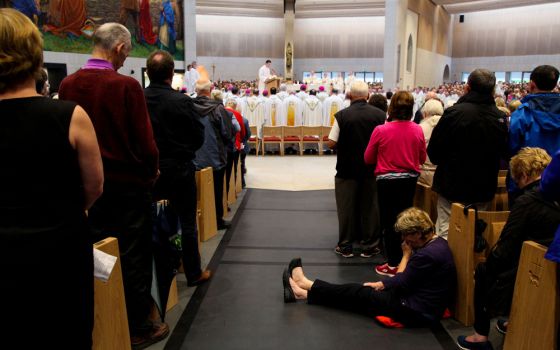
People attend Mass at Knock Shrine in Ireland Aug. 21. The Mass launched the one-year countdown to the 2018 World Meeting of Families in Ireland. (CNS/courtesy John McElroy)
Advertisement
According to the 2005 Vatican instruction by the Vatican Congregation for Catholic Education, "while the church deeply respects the people in question, it cannot admit to the seminary or to Holy Orders those who practice homosexuality, have deeply rooted homosexual tendencies or support the so-called gay culture."
The Italian bishops’ document quotes directly from the Vatican instruction but also suggests that other aspects be taken into account when considering the acceptance of gay candidates to the priesthood. While being openly gay no longer automatically bars a candidate from becoming a priest, such candidates are still held to the same standard of chastity as heterosexual priests are.
In a statement published on Friday, New Ways Ministry, an advocacy group for LGBTQIA Catholics in the U.S., welcomed the document as "a big step forward" in combating discrimination in the church.
"This new clarification treats gay candidates in the same way that heterosexual candidates are treated. That type of equal treatment is what the Church should be aiming for in regards to all LGBTQ+ issues," the statement read.
The possibility of admitting gay men to the priesthood caused a stir in May of last year, when Pope Francis used an anti-gay slur to express his skepticism on the matter in a closed-door meeting with Italian bishops. The Vatican issued an apology, stating that the pope "never meant to offend or express himself with homophobic terms," but Francis has been ambivalent in the past about gay priests and seminarians.
The pope has strongly criticized the "gay lobby" as a center of power in the Vatican and voiced doubts about gay priests’ adherence to a celibate lifestyle, but he also encouraged a young gay seminarian who asked for his advice in his priestly discernment last June.
A provisional document published by the Italian Bishops’ Conference on Friday (Jan. 10) and approved by the Vatican cautiously opens the door for the ordination of openly gay men to the priesthood, while maintaining the normal requirement of chastity.
"In the formative process, when referring to homosexual tendencies, it’s also appropriate not to reduce discernment only to this aspect, but, as for every candidate, to grasp its meaning in the global framework of the young person’s personality," the document reads, adding that the goal is for the candidate to know himself and find harmony between his human and priestly vocation.
The Vatican department for clergy approved the document, which will be valid for three years. The document was signed by the head of the Italian bishops, Cardinal Matteo Zuppi, who is considered a close collaborator to Pope Francis.
The objective of the preparation for a candidate who is seeking to become a priest when it comes to his sexuality, the document states, "is the ability to accept as a gift, to freely choose and to live chastity in celibacy in a responsible way."
The document, titled "The Formation of Presbyters in Italian Churches. Guidelines and Rules for Seminaries," was approved by the Italian bishops who met for their general assembly Nov. 13-16 in Assisi. The episcopacy in Italy, where vocations are at an all-time low, has been pushing the envelope in terms of making the Catholic Church more palatable to modern concerns by suggesting a greater role for women in the formation of priests, a commitment to combating sexual abuse and the acceptance of gay men to the priesthood.
Advertisement
According to the 2005 Vatican instruction by the Vatican Congregation for Catholic Education, "while the church deeply respects the people in question, it cannot admit to the seminary or to Holy Orders those who practice homosexuality, have deeply rooted homosexual tendencies or support the so-called gay culture."
The Italian bishops’ document quotes directly from the Vatican instruction but also suggests that other aspects be taken into account when considering the acceptance of gay candidates to the priesthood. While being openly gay no longer automatically bars a candidate from becoming a priest, such candidates are still held to the same standard of chastity as heterosexual priests are.
In a statement published on Friday, New Ways Ministry, an advocacy group for LGBTQIA Catholics in the U.S., welcomed the document as "a big step forward" in combating discrimination in the church.
"This new clarification treats gay candidates in the same way that heterosexual candidates are treated. That type of equal treatment is what the Church should be aiming for in regards to all LGBTQ+ issues," the statement read.
The possibility of admitting gay men to the priesthood caused a stir in May of last year, when Pope Francis used an anti-gay slur to express his skepticism on the matter in a closed-door meeting with Italian bishops. The Vatican issued an apology, stating that the pope "never meant to offend or express himself with homophobic terms," but Francis has been ambivalent in the past about gay priests and seminarians.
The pope has strongly criticized the "gay lobby" as a center of power in the Vatican and voiced doubts about gay priests’ adherence to a celibate lifestyle, but he also encouraged a young gay seminarian who asked for his advice in his priestly discernment last June.
Pope Francis has named three U.S. experts — two women and an abbot — to be members of the Dicastery for Divine Worship and the Discipline of the Sacraments, a position once reserved for cardinals and bishops.
The three whose appointments were announced by the Vatican Jan. 11 were: Mary Healy, a biblical scholar and professor of Scripture at Sacred Heart Seminary in Detroit; Donna Orsuto, a theologian and co-founder and former director of the Lay Centre at Foyer Unitas in Rome; and Benedictine Abbot Jeremy Driscoll of Mount Angel Abbey in Oregon.
All three had been serving as consultors of the dicastery and became the first non-bishops to join the more than 40 cardinal-and bishop-members.
Their appointments come less than a week after the pope appointed the first female prefect of a dicastery, a possibility opened by "Praedicate Evangelium," the pope's 2022 constitution reforming the Roman Curia.
Orsuto, who is from Ashtabula, Ohio, has lived in Rome for nearly five decades. She is director of the Department of Moral Theology and Spiritual Theology at Rome's Pontifical Gregorian University where she has been teaching since 1990. She served as director of the Lay Centre from 1986 to 2024 and now serves as senior adviser and a member of its board of directors.
Healy, who grew up on Long Island, New York, is one of the first three women ever appointed to the Pontifical Biblical Commission, which she joined in 2014. She has also served as a member of the Catholic-Pentecostal International Dialogue, which is coordinated by the Dicastery for Promoting Christian Unity.
Abbot Driscoll, an expert on the church fathers and the new evangelization, was elected the 12th abbot of Mount Angel Abbey in 2016. He taught theology at Mount Angel Seminary and the Pontifical Atheneum of Sant'Anselmo in Rome. He also serves on various Vatican commissions and leads retreats in the United States and elsewhere.
Advertisement
The appointments came as Francis also appointed several new cardinals, who were welcomed into the College of Cardinals Dec. 7, to be members of the dicasteries of the Roman Curia.
Some of the appointments include the following:
— At the Dicastery for the Doctrine of the Faith: Cardinals Pablo Virgilio Siongco David of Kalookan, Philippines; Jaime Spengler of Porto Alegre, Brazil; Ignace Bessi Dogbo of Abidjan, Ivory Coast; and Roberto Repole of Turin, Italy.
— Dicastery for Bishops: Cardinal Rolandas Makrickas, coadjutor archpriest of Rome's Basilica of St. Mary Major.
— Dicastery for Clergy: Cardinal Baldassare Reina, vicar for the Diocese of Rome.
— Dicastery for the Causes of Saints: Cardinal Dominique Joseph Mathieu of Tehran and Isfahan, Iran.
— Dicastery for Culture and Education: Cardinal Mykola Bychok of the Ukrainian Eparchy of Sts. Peter and Paul of Melbourne, Australia.
— Dicastery for Legislative Texts: Cardinal Frank Leo of Toronto.
— Dicastery for Communication: Cardinal Tarcisio Isao Kikuchi of Tokyo.






